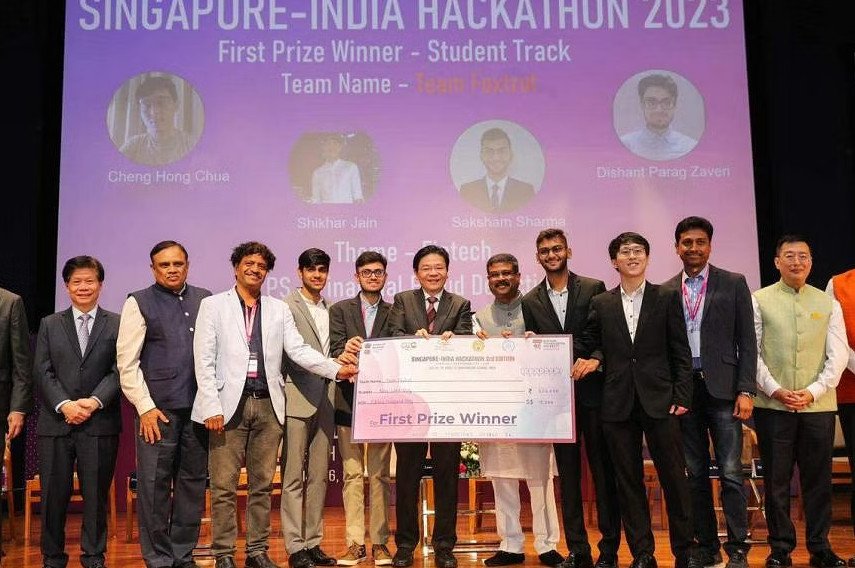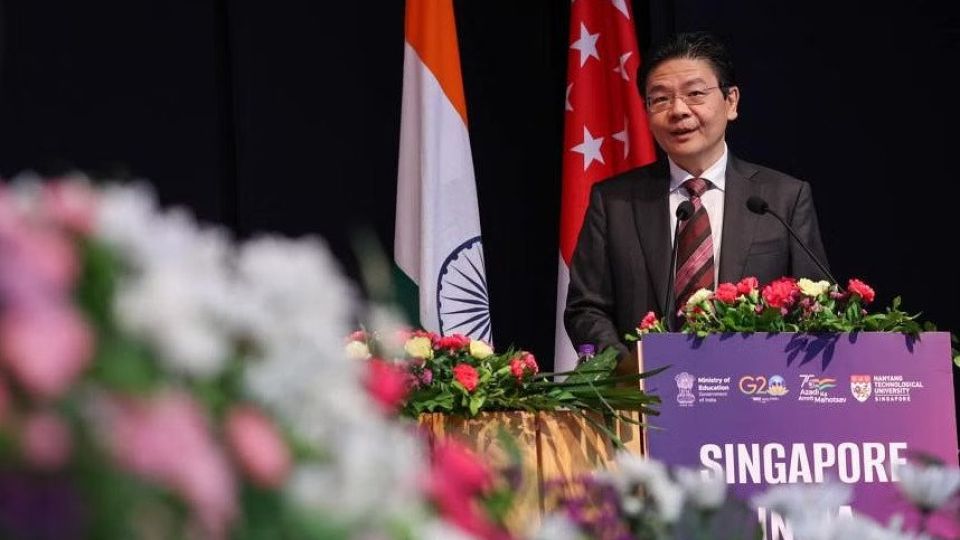July 18, 2023
NEW DELHI – Deputy Prime Minister Lawrence Wong on Sunday said India-Singapore ties are in “excellent shape”, while stressing the need to further deepen people-to-people and business links and expand ties in newer areas of cooperation.
Mr Wong, who is also Minister for Finance, is in Gandhinagar, in India’s Gujarat state, on a five-day visit to attend the third Group of 20 (G-20) Finance Ministers’ and Central Bank Governors’ Meeting (FMCBG).
India currently holds the G-20 presidency.
On Sunday, he attended the award ceremony for the third edition of the Singapore-India Hackathon, where students and start-ups from both countries competed to come up with innovative solutions for financial inclusion and sustainability.
“Overall, our bilateral relations are in excellent shape. Yet there is much more we can do together, especially in new areas of growth,” said Mr Wong at the award ceremony at the Indian Institute of Technology Gandhinagar.
The minister said this was why the India-Singapore Ministerial Roundtable was launched in 2022 to explore new areas of cooperation between the two countries.
Discussions at the inaugural meeting on Sept 17, 2022, had included cooperation on food and energy security; green technology, particularly green hydrogen; digital connectivity; and skills development. The next roundtable will be held later in 2023.
Mr Wong noted that officials from both countries had been “working hard to advance these ideas” and there was progress, highlighting the successful linking of two real-time payment systems – Singapore’s PayNow and India’s Unified Payments Interface.
He said the linkage had “enabled real-time, cheaper and faster cross-border payments” between the two countries.
Mr Wong also highlighted the importance of further deepening people-to-people links.
“To do more together, we also need to build stronger links between our people and our businesses,” he said, noting that the hackathon was one such initiative.
“We need people who can understand the rich cultural diversity of our respective countries, build on our close ties to navigate our respective markets, and capitalise on the many cross-border opportunities that are opening up.”

DPM Lawrence Wong (second from right) called the hackathon a “unique platform” for young talent in a Facebook post. PHOTO: LAWRENCE WONG/FACEBOOK
Twenty-four Singapore and Indian start-ups and 48 students from both countries participated in the hackathon.
In a Facebook post, Mr Wong called the hackathon a “unique platform” for young talent and said Indian Prime Minister Narendra Modi had suggested restarting the hackathon.
He gave a “big shout-out” to the Singaporeans who participated and said they went through “an intense and gruelling 36 hours, mostly without sleep, working closely with their Indian teammates”, but also found the experience fun.
In 2018 and 2019, at the first and second hackathons, mixed teams of university students from both nations developed software solutions for real-life problems in areas such as education and clean energy.
The hackathon was not held in the subsequent three years due to the Covid-19 pandemic.
Noting how Singapore is ranked as one of the most innovative nations, Mr Modi, who sent a written message that was read out at the event, called the hackathon “a pioneering initiative that not only encourages innovation but also promotes cross-cultural exchange and mutual learning”.

DPM Lawrence Wong (second from right) called the hackathon a “unique platform” for young talent in a Facebook post. PHOTO: LAWRENCE WONG/FACEBOOK
Mr Modi had initiated the first hackathon – jointly organised by Nanyang Technological University and the Indian Ministry of Education’s All India Council for Technical Education – in 2018.
Education and Skill Development and Entrepreneurship Minister Dharmendra Pradhan, speaking at the event, said the hackathon “can help in knowledge transfer” between India and Singapore.
“India-Singapore collaboration must deepen,” he noted, highlighting India’s interest in deepening collaboration in skills training.
“There is immense scope for India and Singapore to work together to achieve mutual priorities, particularly towards preparing a future-ready workforce for the entire world,” he said.
Mr Wong also tweeted that he had an “insightful meeting” with Mr Pradhan and noted that both countries have “bold ambitions to deepen our skills and develop our human capital”.
On Sunday, Mr Wong also participated in a ministerial panel discussion under the G-20 banner on finance ministry and multilateral development bank support for financing cities.
Sharing Singapore’s experience in urban planning, he said the best way to develop in an “optimal fashion” was with a good urban master plan and steady, consistent implementation to boost investor confidence.
He cited the current Marina Bay expansion as an example, noting that the Government wanted not just private funding but also the “best ideas” from the private sector for the expansion.
“We are a tiny little island… And because we are so small, we try hard to optimise every inch of land,” he said at the panel discussion.
He also spoke of Singapore’s presence in the Gujarat International Finance Tec-City, India’s first international financial services centre, and said he had inaugurated DBS Bank’s banking unit there on Sunday.
Mr Wong is also attending meetings of the FMCBG, where G-20 ministers will discuss issues such as the state of the global economy, advancing sustainable finance, including policies to transition towards a greener and low-carbon future, and reform of multilateral development banks, said a statement from Singapore’s Ministry of Finance.
DPM Wong will also meet his counterparts on the sidelines of the G-20 FMCBG Meeting, the statement said.


